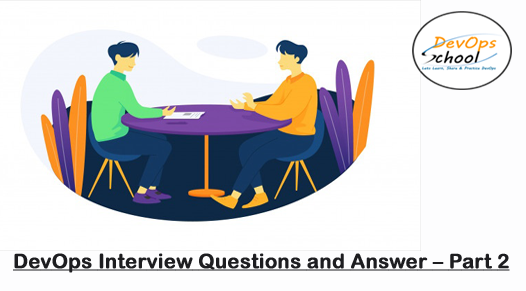
- What DevOps is? Why do we need it?
- Example of answers:
- Why do we need it?
- Increase deployment frequency
- Lower failure rate of new releases
- Shortened lead time between fixes
- Faster mean time to recovery in the event of new release crashing
- What DevOps is?
- CALMS
- C – Culture (promotes collaborative and open culture between Dev and Ops)
- A – Automation (automate wherever applicable)
- L- Learning (continuous learning & experimentation)
- M – Measure (Measure with shared metrics across the Dev and ops for better management)
- S – Sharing (Shared delivery process across Dev and Ops to build , deploy, maintain and monitor product with mentality of One Team – One Goal)
- Why do we need it?
- Example of answers:
- What is the purpose of a post-mortem meeting?
- What is meant by Continuous Integration?
- What are the success factors for Continuous Integration?
- Examples of answers:
- Maintain a code repository
- Automate the build
- Make the build self-testing
- Everyone commits to the baseline every day
- Every commit (to baseline) should be built
- Keep the build fast
- Test in a clone of the production environment
- Make it easy to get the latest deliverables
- Everyone can see the results of the latest build
- Automate deployment
- Examples of answers:
- How would you implement CI (continuous delivery) – end to end, including source control, branches, tools, etc. ?
- What is Continuous Delivery? Continuous Deployment?
- What is the difference between Continuous Integration, Continuous Delivery and Continuous Deployment?
- What’s the difference between git and git-hub ? What about git and SVN ?
- What is
git rebase? - In Git how do you revert a commit that has already been pushed and made public?
- What is puppet/chef/ansible used for? What are the advantages over shell scripts ?
- What do you understand by “Infrastructure as code”? How does it fit into the DevOps methodology? What purpose does it achieve?
- How do you give your developers access to the production logs ?
- Tell me about the worst-run/best-run outage you’ve been a part of. What made it bad/well-run?
- How do you monitor your application ? How do you make sure it is working ? How do you get alerts when it stops working ?
- What would be the availability and performance metrics for a key value store ? What about for MySQL replication ?
- How would you deploy software to 5000 systems?
- What is caching ? Where should a large scale application cache, and what data should be cached ?
Latest posts by Rajesh Kumar (see all)
- How to remove sensitive warning from ms office powerpoint - July 14, 2024
- AIOps and DevOps: A Powerful Duo for Modern IT Operations - July 14, 2024
- Leveraging DevOps and AI Together: Benefits and Synergies - July 14, 2024

